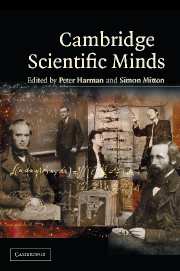Book contents
- Frontmatter
- Contents
- Foreword
- Introduction
- 1 William Gilbert
- 2 William Harvey
- 3 Isaac Newton: Creator of the Cambridge scientific tradition
- 4 William Whewell: A Cambridge historian and philosopher of science
- 5 Adam Sedgwick: A confident mind in turmoil
- 6 Charles Babbage: Science and reform
- 7 Charles Darwin
- 8 Stokes and Kelvin, Cambridge and Glasgow, light and heat
- 9 James Clerk Maxwell
- 10 The duo from Trinity: A.N. Whitehead and Bertrand Russell on the foundations of mathematics, 1895–1925
- 11 Thomson, Rutherford and atomic physics at the Cavendish
- 12 Hopkins and biochemistry
- 13 Charles Sherrington, E.D. Adrian, and Henry Dale: The Cambridge Physiological Laboratory and the physiology of the nervous system
- 14 Hardy and Littlewood
- 15 Arthur Stanley Eddington
- 16 Paul Dirac: A quantum genius
- 17 Alan Turing
- 18 Francis Crick and James Watson
- 19 Mary Cartwright
- 20 Joseph Needham
- 21 Molecular biology in Cambridge
- 22 The discovery of pulsars – prelude and aftermath
- 23 Stephen W. Hawking
17 - Alan Turing
Published online by Cambridge University Press: 05 June 2014
- Frontmatter
- Contents
- Foreword
- Introduction
- 1 William Gilbert
- 2 William Harvey
- 3 Isaac Newton: Creator of the Cambridge scientific tradition
- 4 William Whewell: A Cambridge historian and philosopher of science
- 5 Adam Sedgwick: A confident mind in turmoil
- 6 Charles Babbage: Science and reform
- 7 Charles Darwin
- 8 Stokes and Kelvin, Cambridge and Glasgow, light and heat
- 9 James Clerk Maxwell
- 10 The duo from Trinity: A.N. Whitehead and Bertrand Russell on the foundations of mathematics, 1895–1925
- 11 Thomson, Rutherford and atomic physics at the Cavendish
- 12 Hopkins and biochemistry
- 13 Charles Sherrington, E.D. Adrian, and Henry Dale: The Cambridge Physiological Laboratory and the physiology of the nervous system
- 14 Hardy and Littlewood
- 15 Arthur Stanley Eddington
- 16 Paul Dirac: A quantum genius
- 17 Alan Turing
- 18 Francis Crick and James Watson
- 19 Mary Cartwright
- 20 Joseph Needham
- 21 Molecular biology in Cambridge
- 22 The discovery of pulsars – prelude and aftermath
- 23 Stephen W. Hawking
Summary
Alan Turing was, in a phrase, the founder of computer science. But this article will not rehearse the chronology of achievement or the claims of priority but suggest deeper questions in the motivation and culture of mathematics and its relationship to science and history. There are no definitive answers to these questions, and neither can Alan Turing be comfortably classified as a Cambridge mind; he elicited the contradictions and conflicts of that ambience.
ISOLATION AND UNIVERSALITY
Science now craves public understanding, but popularity sits ill at ease with the years of dedication to learning, challenge to received ideas, and sacrifice of advantage that science requires. Science tries to explain the universe; yet to the public (and to publishers) sits in a small specialist niche. The contradiction is even more marked in mathematics; so few, even within the sciences, can picture modern mathematical research. Recent authors have won praise for conveying the sense of struggle and devotion on the unroyal road, but have done so by omitting serious mathematical content, a musicology without knowledge of music, trying to popularise the essentially unpopular.
This creates an isolation both for mathematical culture, and for individual mathematicians. There are escape routes: one is a parochial tunnel vision, or a sort of mathematical camp, making a joke of everything. But there is a heavier burden for those who see their mathematics as the foundation stone of certainty. Turing expressed this from the beginning.
- Type
- Chapter
- Information
- Cambridge Scientific Minds , pp. 253 - 268Publisher: Cambridge University PressPrint publication year: 2002
- 7
- Cited by



